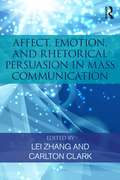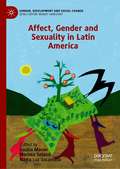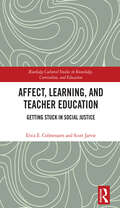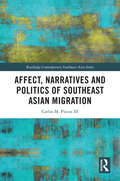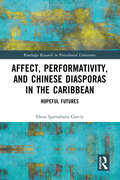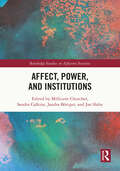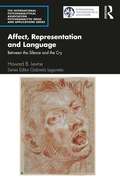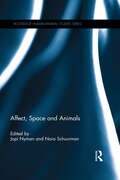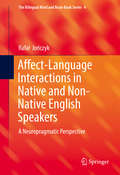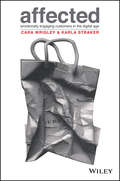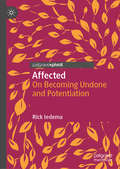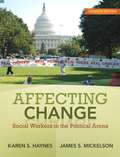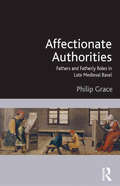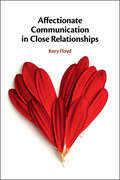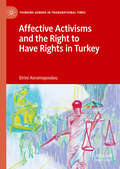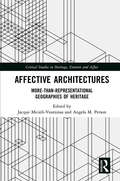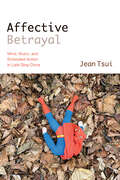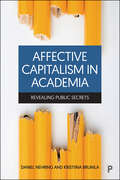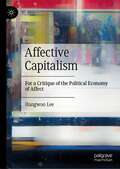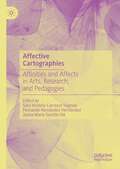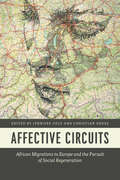- Table View
- List View
Affect, Emotion, and Rhetorical Persuasion in Mass Communication
by Lei Zhang Carlton ClarkThis volume examines the interplay between affect theory and rhetorical persuasion in mass communication. The essays collected here draw connections between affect theory, rhetorical studies, mass communication theory, cultural studies, political science, sociology, and a host of other disciplines. Contributions from a wide range of scholars feature theoretical overviews and critical perspectives on the movement commonly referred to as "the affective turn" as well as case studies. Critical investigations of the rhetorical strategies behind the 2016 United States presidential election, public health and antiterrorism mass media campaigns, television commercials, and the digital spread of fake news, among other issues, will prove to be both timely and of enduring value. This book will be of use to advanced undergraduates, graduate students, and active researchers in communication, rhetoric, political science, social psychology, sociology, and cultural studies.
Affect, Gender and Sexuality in Latin America (Gender, Development and Social Change)
by Cecilia Macón Mariela Solana Nayla Luz VacarezzaThis book emphasizes the significance of affects, feelings and emotions in how we think about politics, gender and sexuality in Latin America. Considering the complex and even contradictory social processes that the region is experiencing today, many Latin American authors are turning to affect to find a key to understand our present situation, to revisit our history, and to imagine new possibilities for the future. This tendency has shown such a specificity and sometimes departure from northern productions that it compels us to focus more deeply on its own arguments, methods, and critical contributions. This volume features essays that explore the particularities of Latin American ways of thinking about affect and how they can shed new light into our understanding of, gender, sexuality and politics.
Affect, Learning, and Teacher Education: Getting Stuck in Social Justice (Routledge Cultural Studies in Knowledge, Curriculum, and Education)
by Erica E. Colmenares Scott JarvieThis volume inquires into student teachers’ “stuck moments”—moments of felt crisis—as they occur within the context of a university-based social justice teacher education (SJTE) program. The book complicates the notion that these stuck moments are primarily effects of a gap between theory and practice. Instead, Colmenares and Jarvie argue for a more robust conceptualization, drawing on affect theory, posthumanism, and Deleuzian scholarship. By considering what stuck moments do, and do to, student teachers, the book reimagines SJTE in ways that are both responsive to stuckness and disruptive of discourses of learning that dominate the field. Through a critique of the affective workings of learning, the authors consider how these discourses can prove counterproductive for the work of teaching for social justice. This insightful and stimulating volume will be of use to scholars, researchers, and students with interests in curriculum studies, affective approaches to education and SJTE.
Affect, Narratives and Politics of Southeast Asian Migration (Routledge Contemporary Southeast Asia Series)
by Carlos M. Piocos IIIThis book explores the politics of gendered labor migration in Southeast Asia through the stories and perspectives of Indonesian and Filipina women presented in films, fiction, and performance to show how the emotionality of these texts contribute to the emergence and vitality of women’s social movements in Southeast Asia. By placing literary and filmic narratives of Filipina and Indonesian domestic workers in Hong Kong and Singapore within existing conversations concerning migration policies, the book offers an innovative approach towards examining contemporary issues of Asian migration. Furthermore, through rich ethnographic accounts, the book unpacks themes of belonging and displacement, shame and desire, victimhood and resistance, sacrifice, and grief to show that the stories of Filipina and Indonesian migrant women don't just depict their everyday lives and practices but also reveal how they mediate and make sense of the fraught politics of gendered labor diaspora and globalization. Contributing to the "affective turn" of feminist and transnational scholarship, the book draws insight from the importance and centrality of affect, emotions, and feelings in shaping discourses on women’s subjectivity, labor, and mobility. In addition, the book demonstrates the issues of vulnerability and agency inherent in debates on social exclusion, human rights, development, and nation-building in Southeast Asia. Offering an innovative and multidisciplinary approach to analyses of Asian migration, this book will be of interest to academics in the fields of Asian Studies, literary and cultural studies, film studies, gender and women’s studies, and migration studies.
Affect, Performativity, and Chinese Diasporas in the Caribbean: Hopeful Futures (Routledge Research in Postcolonial Literatures)
by Elena Igartuburu GarcíaAffect, Performativity, and Chinese Diasporas in the Caribbean: Hopeful Futures analyzes the emergence of Chinese diasporic literature and art in the Caribbean and its diasporas in the twenty-first century. This book considers the historical and critical discourse about the Chinese diasporas in the Caribbean and proposes a textual and visual archive selecting contemporary texts that signal a changing paradigm in postcolonial literature at the turn of the twenty-first century. Whereas, historically, Chinese minorities had been erased or presented as ultimate Others, contemporary texts mobilize Chinese characters and their stories strategically to propose alternative configurations of community and belonging grounded in affective structures and contest the coloniality of national imaginaries.
Affect, Power, and Institutions (Routledge Studies in Affective Societies)
by Jan Slaby Sandra Calkins Millicent Churcher Jandra BöttgerThis volume advances a comprehensive transdisciplinary approach to the affective lives of institutions – theoretical, conceptual, empirical, and critical. With this approach, the volume foregrounds the role of affect in sustaining as well as transforming institutional arrangements that are deeply problematic. As part of its analysis, this book develops a novel understanding of institutional affect. It explores how institutions produce, frame, and condition affective dynamics and emotional repertoires, in ways that engender conformance or resistance to institutional requirements. This collection of works will be important for scholars and students of interdisciplinary affect and emotion studies from a wide range of disciplines, including social sciences, cultural studies, social and cultural anthropology, organizational and institution studies, media studies, social philosophy, aesthetics, and critical theory.
Affect, Representation and Language: Between the Silence and the Cry (The International Psychoanalytical Association Psychoanalytic Ideas and Applications Series)
by Howard B. LevineThis book presents and elaborates on the rationale and implications of the transformational dimension of psychoanalysis. In so doing, it attempts to extend psychoanalytic theory and practice beyond neurosis and beyond what were formerly thought to be the limits of analytic understanding. Its theoretical vision sits at the crossroads of the thinking of Freud, Bion, Winnicott, Green and the Paris Psycho-Somatic School. Other sources include the contributions of contemporary French psychoanalysts such as Laplanche, Donnet, L. Kahn, P. Miller and the Botellas, along with the work of Alvarez, Scarfone, Ferro, Ogden, and more. In re-examining the very epistemological foundations of psychoanalysis and their implications for a theory of psychic functioning, it follows upon and extends the radical implications of Freud’s 1937 Constructions paper, the thoughts of Bion on intuition and Winnicott’s understanding of the working through of the consequences of early pre-verbal environmental failure. In so doing, it makes a case for psychoanalysis as a powerful treatment for borderline, primitive narcissistic, post-traumatic and other character disorders and conditions – including perversions, addictions, psychosomatic, autistic and panic disorders. By presenting a revised metapsychology that is Freudian, contemporary and clinically near, Affect, Representation and Language. Between the Silence and the Cry offers practitioners at all levels of analytic experience a way of understanding and treating the expanding range of patients and disorders that present for treatment in our modern era.
Affect, Space and Animals (Routledge Human-Animal Studies Series)
by Jopi Nyman Nora SchuurmanIn recent years, animals have entered the focus of the social and cultural sciences, resulting in the emergence of the new field of human-animal studies. This book investigates the relationships between humans and animals, paying particular attention to the role of affect, space, and animal subjectivity in diverse human-animal encounters. Written by a team of international scholars, contributions explore current debates concerning animal representation, performativity, and relationality in various texts and practices. Part I explores how animals are framed as affective, through four case studies that deal with climate change, human-bovine relationships, and human-horse interaction in different contemporary and historical contexts. Part II expands on the issue of relationality and locates encounters within place, mapping the different spaces where human-animal encounters take place. Part III then examines the construction of animal subjectivity and agency to emphasize the way in which animals are conscious and sentient beings capable of experiencing feelings, emotions, and intentions, and active agents whose actions have meaning for the animals themselves. This book highlights the importance of the ways in which affect enables animal agency and subjectivity to emerge in encounters between humans and animals in different contexts, leading to different configurations. It contributes not only to debates concerning the role of animals in society but also to the epistemological development of the field of human-animal studies.
Affect-Language Interactions in Native and Non-Native English Speakers: A Neuropragmatic Perspective (The Bilingual Mind and Brain Book Series)
by Rafał JończykThis volume provides an up-to-date and evaluative review of theoretical and empirical stances on emotion and its close interaction with language and cognition in monolingual and bilingual individuals. Importantly, it presents a novel methodological approach that takes into account contextual information and hence goes beyond the reductionist approach to affective language that has dominated contemporary research. Owing to this pragmatic approach, the book presents brand new findings in the field of bilingualism and affect and offers the first neurocognitive interpretation of findings reported in clinical and introspective studies in bilingualism. This not only represents an invaluable contribution to the literature, but may also constitute a breakthrough in the investigation of the worldwide phenomenon of bilingualism. Beginning with a thorough review of the history and current state of affective research and its relation to language, spanning philosophical, psychological, neuroscientific, and linguistic perspectives, the volume then proceeds to explore affect manifestation using neuropragmatic methods in monolingual and bilingual individuals. In doing so, it brings together findings from clinical and introspective studies in bilingualism with cognitive, psychophysiological and neuroimaging paradigms. By combining conceptual understanding and methodological expertise from many disciplines, this volume provides a comprehensive picture of the dynamic interactions between contextual and affective information in the language domain. Thus, Affect-Language Interactions in Native and Non-Native English Speakers: A Neuropragmatic Perspective fosters a pragmatic approach to research on affective language processing in monolingual and bilingual population, one that builds bridges across disciplines and sparks important new questions in the cognitive neuroscience of bi- and multilingualism.
Affected Labour in a Café Culture: The Atmospheres and Economics of 'Hip' Melbourne (Routledge Research in Culture, Space and Identity)
by Alexia CameronWhat does it mean to work in the ‘hip’ postmodern economy? This book develops the concept of ‘affected labour’ within Melbourne, Australia. Through the lens of café and bar culture, the book provides an ethnographic investigation into the ways that affect arises, circulates, sticks and dissipates over the course of everyday encounters. The dynamics and atmospheres of affective labour among those working in the hospitality-oriented environments are unfolded. Service work is rooted in the notion that labour is ‘performed’ by an exhausted worker for a demanding customer. This book goes beyond this idea by describing the way not only consumers are moved by the experience and seduced by the atmosphere, but more pressingly workers and employers. This book reveals the ways in which workers themselves are capitalised on by being affected pleasurably in the moment, fuelling an economy of short-term desires in which ‘affected labourers’ are manipulated.
Affected: Emotionally Engaging Customers in The Digital Age
by Cara Wrigley Karla StrakerHow can you create meaningful connections with customers in the digital space? The rapid emergence of new technologies has revolutionized the way companies build relationships and interact with their customers. Today, it’s more important than ever to have an emotional understanding of customers and how they feel about a product, service, or business, even when your primary interactions are via digital channels. Affected goes beyond influencing behaviors to understanding cognition and emotion as a way to better connect with customers in the digital space. In it, Wrigley and Straker offer a new approach—one that examines channel relationships and useful concepts for clarifying and refining the emotional meaning behind company strategy and their relationship to corresponding channels. Using case study examples from and over a decade of primary research in the area, they discuss the process and impact of such emotionally aware channel designs. Spanning entrepreneurial start-up techniques of wunderkind artist Cj Hendry through to the lucrative retail sector of luxury brand Burberry, this seminal book offers multi-channel design approach that can show companies how to select, design, and maintain digital engagements based on their strategy and industry needs. Shows businesses how they can better understand and engage with customers digitally Demonstrates how to gain competitive advantage by integrating design methods into corporate strategy Provides multi-channel approaches for how businesses can select, design, and maintain digital engagements Establishes a clear framework for analysing and applying the right strategy for your digital engagement Connecting and engaging with customers is pivotal to business success, but in the digital space the old methods just won’t cut it. With Affected, you’ll find the tools and techniques you need to find your customers where they are.
Affected: On Becoming Undone and Potentiation
by Rick IedemaThis book explores the implications and relevancies of personal affect and organisational complexity for navigating organisational processes, relationships, changes and aspirations. In today’s climate, worker roles, relations and responsibilities are becoming increasingly complex and variable. Using personal experiences of organisational conflict as a point of departure, this book reflects on organisational change, complexity and research.It moves from experiential towards theoretical and methodological issues, exploring the question of how to confront and intervene in organisational complexity. Among others, the main theories brought to bear on this question include complexity theory, affect theory and sphere theory (or ‘spherology’). The research approaches and methodologies discussed include anthropology/ethnography, discourse studies, visual research and (the turn to) participatory enquiry.The book’s main message is to advocate for a collaborative, affective, visualised and future-oriented research agenda that rejects the conventional objectivist break and ‘division of learning’ characterising researcher-researched relationships. It will appeal to students and academics working in the fields of alternative research methods, the social sciences, organisational studies and management theory.
Affecting Change: Social Workers in the Political Arena
by Karen S. Haynes James S. MickelsonUpdated to reflect advances in a changing political arena of Obama's administration, this revision shows students how to develop political action skills and to take advantage of the opportunity of change. This practical, step-by-step guide focuses on advocacy as the central mission of social work practice. New material and 17 new personal scenarios involving social workers who have made a difference-senators, representatives, and officials in the political arena-serve to inspire students. Revised chapters show how social work skills can be most effective, whether by impacting the political arena as a social worker or running for office.
Affection and Trust: The Personal Correspondence of Harry S. Truman and Dean Acheson, 1953-1971
by Dean Acheson Harry S. TrumanPublished for the first time: the personal letters of President Harry S. Truman and his secretary of state, Dean Acheson, from 1953, the year when both were newly out of office, until Acheson's death at the age of 78 in 1971.
Affection: An Erotic Memoir
by Krissy KneenKrissy Kneen loves sex . . . and she's not afraid to talk about it. In this sometimes hilarious, sometimes poignant, and sometimes terrifying memoir, she traces the arc of her sexual life - from her childhood in a sexless household to the myriad sexual encounters of her young and adult life to the present, in which she is a married (and monogamous) 40-year-old woman. Raised by a group of protective and eccentric women who expressly forbade any and every sign of sexuality, Krissy - an unusually sensual young girl - discovered early on that illicit pleasures are the best kind. Affection follows the path of Kneen's life journey, from the compulsive sexual self-exploration of her childhood to her experiences as a young woman for whom the world is a sexual playground. Underlying the jaw-dropping details of her many sexual escapades is Kneen's examination of how her sense of self shapes and is shaped by those experiences, and of her struggle to satisfy her own needs in the face of a limiting, and often judgmental, society. Affection is a frank, often erotic look at one woman's sexuality as she grows and changes in a world that continues to see only the young and the beautiful amongst us as sexual beings - and a chronicle of her refusal to conform to that misconception.
Affectionate Authorities: Fathers and Fatherly Roles in Late Medieval Basel
by Philip GraceIn one of his sermons, the medieval preacher Bernardino of Siena listed seven ’fathers’ to whom one owed obedience: God, one’s natural father, godfather, confessor, benefactor, a government official, and any elderly man. This book seeks to answer the question of why medieval Europeans saw the need for so many ’fathers.’ Why was fatherhood so appealing as a metaphor? Situated at the intersection of social and cultural history, the study draws upon a variety of late-medieval and early-modern sources including witness depositions, personal letters and pedagogical treatises from the city of Basel, Switzerland. It focuses on how people from different walks of life invoked ideas about fatherhood in the pursuit of various goals - not only the ideological agendas of scholarly elites, but also the more pragmatic problems of closing a business deal, claiming an inheritance, or choosing sides in a fistfight - before turning to what these ideas reveal about fatherhood ’on the ground.’ The book argues that it was precisely fatherhood’s basis in lived experience that gave it a familiar ’shape’ in the several roles that fathers played, including provision, affection, disciplinary authority, and education. The most potent rhetorical aspect of fatherhood, however, was not as a static image or shape, but rather the possibility of invoking connections between one role and another. The most potent connection between roles was the idea that fathers were 'affectionate authorities,' combining power over subordinates with desire for their well-being. Tracing the connections and contradictions of these identities, this study provides a nuanced view of concepts of fatherhood on the eve of the Reformation.
Affectionate Communication in Close Relationships
by Kory FloydFew communication behaviors are more consequential to the development and maintenance of close relationships than the expression of affection. Indeed, people often use affectionate gestures to initiate or accelerate relationship development. In contrast, the absence of affection in established relationships frequently coincides with relational deterioration. This text explores the scientific research on affection exchange that has emerged from the disciplines of communication, social and clinical psychology, family studies, psychophysiology, sociology, nursing, and behavioral health. Specific points of focus include the individual and relational benefits - including health benefits - of affectionate behavior, the significant detriments associated with lacking sufficient affection, and the risks of expressing affection. It also discusses the primary social and cultural influences on affection exchange, critiques principal theories and measurement models, and offers suggestions for future empirical research.
Affective Activisms and the Right to Have Rights in Turkey (Thinking Gender in Transnational Times)
by Eirini AvramopoulouThis book presents a novel approach to the study of contemporary social movements and activism. Based on extensive ethnographic research of the life and politics of feminist, LGBTQI+, and women’s religious groups in Istanbul from 2007 to 2015, it explores the affects, meanings, and interpretations these groups express in their activism—in particular, their strategic use of human rights’ language to claim institutional and social legitimacy and their reinterpretation of gender/queer theory across politics of difference to make sense of global dynamics that affect their everyday lives. Chapters interweave personal accounts and life histories of individual activists with specific historical events to demonstrate the activists’ dissidence regarding the conditions that have defined their differently marginalised positions in Turkey and the significance of the formation of unexpected alliances. The ambivalent, yet inescapable, bargaining tool of rights is analysed as a demand over affective democratic visions, citizenship and a life worth living, and thus the right to have rights, as it is argued, pushes us to reflect on how power works when the political and affective surplus value invested in the need to rethink of rights (even beyond human rights themselves) lies both in the search for ways of institutionalising and implementing rightful demands, as well as in outlining more affective visions of political resistance. By arguing that activism is a performative and affective language that is defined by intersectional hopes, desires and dreams, as much as it engages with legal battles that define who or what might appear as being broken under specific historical and social settings, Affective Activisms employs gender and sexuality as analytical tools to make sense of local and transnational politics of resistance in the face of the re-emergence of authoritarian regimes, sexual harassment, gender violence, homo/trans phobia, and Islamophobia in Turkey and worldwide. It will be of interest to students and scholars across the fields of women's, gender and sexuality studies, queer theory, critical human rights and political theory, sociology, and social anthropology.
Affective Architectures: More-Than-Representational Geographies of Heritage (Critical Studies in Heritage, Emotion and Affect)
by Jacque Micieli-Voutsinas Angela M. PersonHow do places manipulate our emotions? How are spaces affectious in their articulation and design? This book provides theoretical frameworks for exploring affective dimensions of architectural sites based on the notion that heritage, as an embodied experience, is embedded in places and spaces. Drawing together an interdisciplinary collection of essays spanning geographically diverse architectural sites — including Ford’s Theater, the site of President Lincoln’s assassination; the Estadio Nacional of Santiago, Chile, where 12,000 detainees were held following the ouster of President Salvador Allende; and Unit 731, the site of a biological and chemical warfare research unit of the Imperial Japanese army in Harbin, China, amongst others — this edited collection assembles critical dialogue amongst scholars and practitioners engaging in affective and other more-than-representational approaches to cultural memory, heritage, and identity-making. Broken into three main sections: Affective Politics; Embedded Geographies; and Affective Methodologies, this book draws together multidisciplinary perspectives from the arts, social sciences and humanities to understand the role of architecture in generating embodied experiences at places of memory. This book offers interdisciplinary perspectives on fundamental questions of memory, identity and space. It will be of interest to students and scholars in the fields of geography, architecture, cultural studies, and museum and heritage studies.
Affective Betrayal: Mind, Music, and Embodied Action in Late Qing China (SUNY series in Chinese Philosophy and Culture)
by Jean TsuiAffective Betrayal uses "affect" as an analytical category to explicate the fragility and fragmentation of Chinese political modernity. In so doing, the book uncovers some of the unresolved moral and philosophical obstacles China encountered in the past, as well as the cultural predicament the country faces at present.At the turn of the twentieth century, China's leading reformer Liang Qichao (1873–1929) presented modern political knowledge in musical and visual representational formats that were designed to stimulate readers' bodily senses. By expanding the reception of textual knowledge from "reading" to "listening" and "visualizing experiences," Liang generated an epistemic shift, and perhaps an all-inclusive internal intellectual, philosophical, and moral transition, alongside China's modern political reform. By tracing the marginalized academic and philosophical positions Liang sought to restore in China's incipient democratic movement, Affective Betrayal examines how his attempts to conjoin Confucian morality and liberal democracy expose hidden anxieties as well as inherent contradictions between these two systems of thought. These conflicts, besides disrupting the stability of China's burgeoning modern political order, explain why the import of modern concepts led to China's continued political impasse, rather than rationality and progress, after the 1911 revolution.
Affective Capitalism in Academia: Revealing Public Secrets
by Daniel Nehring and Kristiina BrunilaDrawing on affect theory and research on academic capitalism, this book examines the contemporary crisis of universities. Moving through 11 international and comparative case studies, it explores diverse features of contemporary academic life, from the coloniality of academic capitalism to performance management and the experience of being performance-managed. Affect has emerged as a major analytical lens of social research. However, it is rarely applied to universities and their marketisation. Offering a unique exploration of the contemporary role of affect in academic labour and the organisation of scholarship, this book considers modes of subjectivation, professional and personal relationships and organisational structures and their affective charges. Chapter 9 is available Open Access via OAPEN under CC-BY-NC-ND licence.
Affective Capitalism: For a Critique of the Political Economy of Affect
by Hangwoo LeeDrawing on Tarde's and Deleuze’s monadology, this book investigates the affective turn of contemporary capitalism. The concept of affect provides critical insight to overcome the limitations of social constructivism and cognitive capitalism. Affective capitalism transforms the population’s everyday bodily experiences into quantitative metrics that can be observed, measured, and processed on a non-conscious register, turning them into dividuals prepared to react and be affected by specific information at a given moment. In an era where social wealth increasingly relies on the 'social factory,' algorithms and big data constitute the living labor beyond employment. This book argues that affect also holds a potential for dismantling today’s real subsumption of life by capital. The network effect, mostly actualized as a company's market capitalization, is constantly traversed by the molecular becoming of affect, leading to new assemblages, such as free software movement, decentralized platforms, peer-to-peer networking, blockchain, and universal basic income.
Affective Cartographies: Affinities and Affects in Arts, Research, and Pedagogies
by Sara Victoria Carrasco Segovia Fernando Hernández Hernández Juana María Sancho-GilThis book focuses on cartographies as epistemology and visual strategy, highlighting three major axes: corporeal, affective, and nomadic learning. Based on the onto-episte-methodological and ethical displacement from reductive approaches, the book emphasizes new ways of understanding arts, research, teaching and learning processes at the university and beyond. Contributions highlight practices focused on dialogue, sharing, readings and philosophical discussions which allow educators to move away from what is typically thought of as ‘correct’, and reinforce the importance of a decolonized approach to learning and knowledge, understanding the (re)search process as an imperfect journey in becoming.
Affective Circuits: African Migrations to Europe and the Pursuit of Social Regeneration
by Jennifer Cole Christian GroesThe influx of African migrants into Europe in recent years has raised important issues about changing labor economies, new technologies of border control, and the effects of armed conflict. But attention to such broad questions often obscures a fundamental fact of migration: its effects on ordinary life. Affective Circuits brings together essays by an international group of well-known anthropologists to place the migrant family front and center. Moving between Africa and Europe, the book explores the many ways migrants sustain and rework family ties and intimate relationships at home and abroad. It demonstrates how their quotidian efforts--on such a mass scale--contribute to a broader process of social regeneration. The contributors point to the intersecting streams of goods, people, ideas, and money as they circulate between African migrants and their kin who remain back home. They also show the complex ways that emotions become entangled in these exchanges. Examining how these circuits operate in domains of social life ranging from child fosterage to binational marriages, from coming-of-age to healing and religious rituals, the book also registers the tremendous impact of state officials, laws, and policies on migrant experience. Together these essays paint an especially vivid portrait of new forms of kinship at a time of both intense mobility and ever-tightening borders.
Affective Communities in World Politics
by Emma HutchisonEmotions underpin how political communities are formed and function. Nowhere is this more pronounced than in times of trauma. The emotions associated with suffering caused by war, terrorism, natural disasters, famine and poverty can play a pivotal role in shaping communities and orientating their politics. This book investigates how 'affective communities' emerge after trauma. Drawing on several case studies and an unusually broad set of interdisciplinary sources, it examines the role played by representations, from media images to historical narratives and political speeches. Representations of traumatic events are crucial because they generate socially embedded emotional meanings which, in turn, enable direct victims and distant witnesses to share the injury, as well as the associated loss, in a manner that affirms a particular notion of collective identity. While ensuing political orders often re-establish old patterns, traumatic events can also generate new 'emotional cultures' that genuinely transform national and transnational communities.
